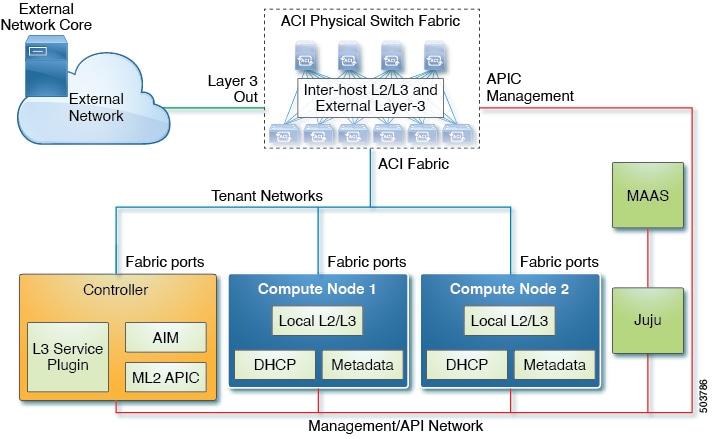This is an example of the configuration juju-aci-ussuri.yaml file.
mysql:
max-connections: 1300
keystone:
openstack-origin: 'cloud:bionic-ussuri'
admin-password: 'noir0123'
log-level: 'DEBUG'
verbose: true
debug: true
nova-cloud-controller:
openstack-origin: 'cloud:bionic-ussuri'
network-manager: Neutron
console-access-protocol: novnc
neutron-gateway:
plugin: aci
openstack-origin: 'cloud:bionic-ussuri'
data-port: 'br-data:bond0'
vlan-ranges: physnet1:250:300
enable-isolated-metadata: true
enable-metadata-network: true
aci-repo: 'deb http://1.11.1.1/ubuntu ussuri32 main'
aci-apic-system-id: juju2-ostack
aci-encap: vxlan
aci-uplink-interface: bond0
aci-infra-vlan: 3901
neutron-api:
openstack-origin: 'cloud:bionic-ussuri'
neutron-plugin: aci
neutron-security-groups: true
#vlan-ranges: physnet1:250:300
neutron-aci-opflex:
aci-repo: 'deb http://1.11.1.1/ubuntu ussuri32 main'
aci-apic-system-id: juju2-ostack
aci-encap: vxlan
aci-uplink-interface: bond0
aci-infra-vlan: 3901
rabbitmq-server:
## Cinder is deployed in two parts: one for the API and scheduler
## (which can live in a container), one for the volume service (which
## cannot, at least not for the LVM/iSCSI backend)
cinder-api:
openstack-origin: 'cloud:bionic-ussuri'
enabled-services: api,scheduler
cinder-volume:
openstack-origin: 'cloud:bionic-ussuri'
enabled-services: volume
# Adjust this to match the block device on your volume host
block-device: vdb
glance:
openstack-origin: 'cloud:bionic-ussuri'
heat:
openstack-origin: 'cloud:bionic-ussuri'
mysql:
openstack-dashboard:
openstack-origin: 'cloud:bionic-ussuri'
webroot: /
vip_iface: bond0
nova-compute:
openstack-origin: 'cloud:bionic-ussuri'
virt-type: kvm
##
## ACI
##
neutron-api-plugin-aci:
aci-repo: 'deb http://1.11.1.1/ubuntu ussuri32 main'
aci-apic-hosts: 10.3.12.1
aci-apic-username: admin
aci-apic-password: k%jiou^
aci-apic-entity-profile: my-aep
aci-apic-system-id: juju2-ostack
aci-encap: vxlan
aci-vlan-ranges: 250:300
aci-connection-json: '{"101": ["srv1:vpc-1-25/101-102-1-25", "srv2:vpc-1-26/101-102-1-26",
"srv3:vpc-1-27/101-102-1-27", "srv4:vpc-1-28/101-102-1-28", "srv5:vpc-1-29/101-102-1-29"],
"102": ["srv1:vpc-1-25/101-102-1-25", "srv2:vpc-1-26/101-102-1-26", "srv3:vpc-1-27/101-102-1-27",
"srv4:vpc-1-28/101-102-1-28", "srv5:vpc-1-29/101-102-1-29"]}'
aci-vpc-pairs: '101:102'
#
openstack-dashboard-plugin-gbp:
aci-repo: 'deb http://1.11.1.1/ubuntu ussuri32 main'
For verification and troubleshooting commands, see relevant JuJu documentation.

 Feedback
Feedback